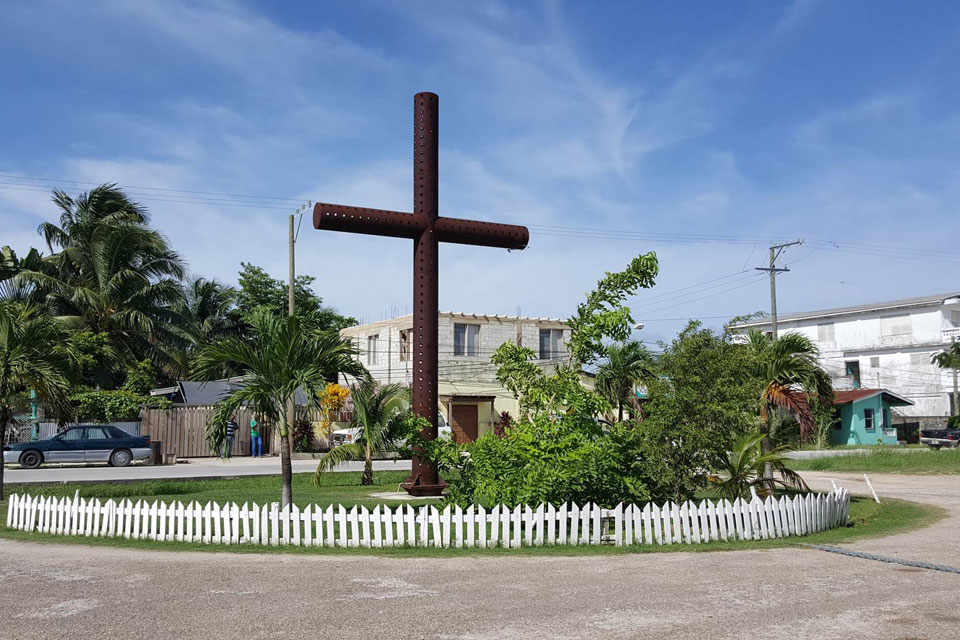Living the Mission in Belize
To hear Matt Ruhl, S.J., pastor of St. Martin de Porres Parish in Belize, talk about the country is to be transported into a paradise. With his vivid description he offers a perfect opening line for an article.
“You might say: On the Caribbean shores, on the Yucatan peninsula, lies a country so lovely that the locals refer to it as the Jewel.” He calls Belize “the melting pot of the melting pot,” and his whole body lights up when describing it. Ruhl’s love for Belize is evident – and it colors everything he does for his parish and his city.
Located in an impoverished, gang-ridden area of Belize City where children and families struggle to survive is St. Martin de Porres Parish, a Jesuit apostolate for 50 years. There, Ruhl (Grad A&S ’86) works to improve the lives of families and enrich the futures of the 739 students enrolled in the parish school. Ruhl contends that Belize suffers the same social problems any major city might face. “I worked in East St. Louis and North St. Louis, and I’m here to tell you that it’s a mirror image, except it’s in Central America,” he said.
Faced with overwhelming poverty and sadness, Ruhl – who received his Master of Arts in English from SLU – knew that he could count on the community at Saint Louis University to help him out. So he reached out to SLU alumnus Tom Nolan (A&S ’69, Grad ’70), who connected Ruhl to Ellen Harshman (Grad Ed ’78, Law ’92), dean emeritus and now director of bicentennial planning, and Chris Collins, S.J., assistant to the president for mission and identity. Together, the group coordinated efforts to help out with the school. At the same time, Ruhl reached out to longtime friend Mark LaBarge and requested his support in the mission of the church itself.
Recognizing that a coordinated approach would be best, the three groups – Belizeans, Saint Louis University representatives and LaBarge’s business contacts – came together to hold a symposium, out of which came Belize 2020, an Ignatian-based project aimed at improving the lives of Belizean children and families by the year 2020.
Ruhl and LaBarge credit SLU’s involvement for the organized, research-based approach Belize 2020 is able to take. LaBarge recalled SLU’s “disciplined, professional approach” to tackling issues such as poverty and mental health.
“On a lot of these topics in Belize City and St. Martin’s, we were somewhat speculative,” LaBarge said. “You know there’s this or that going on, but you don’t know that much. And SLU, they were able to develop a study, conduct the study and interpret the results. So that’s where these questions are getting answered.”
One of the biggest questions that SLU helped answer had to do with the mental state of Belize City’s children. Misty Michael, Director of Belize 2020 in Belize, recalls SLU researchers visiting and determining that just under half of St. Martin’s students suffer from post-traumatic stress – both from the gang violence that plagues their streets and from domestic violence. From that shocking study came Project HEAL (Hope & Education Altering Lives), an extended school day and year-round program based off of the Nativity Schools, which includes a trained counselor treating the middle school-aged children, as well as extra help in literacy, physical fitness, math and art.
For Michael, Project HEAL isn’t just about teaching kids to read. It’s about changing lives. “Because we are working with very young kids, St. Martin’s and Belize 2020 give them the hope they really need,” she said. “A lot of these kids, in their head, think they’ll be dead by the time they’re 30. So a lot of our job is to give them that hope – that your life has more meaning than you think it does right now.”
That hope filters through everything Belize 2020 does – from the construction of a new multipurpose center named Swift Hall to a partnership with SLU’s business school to further research job creation. It’s also inspired a cyclical process in which SLU provides teacher training at St. John’s College, a high school and community college in Belize, which then works with St. Martin’s to prepare its elementary school students for high school and college.
Everything that Belize 2020 does is inspired by its Ignatian roots. Ruhl credits the 1973 speech by Pedro Arrupe, S.J., in which he called on Jesuits to be “men and women for others,” for inspiring a generation of people to enter into a life of service. Agreeing, LaBarge said the involvement of the Jesuits helped in his decision to join. “If the Jesuits are there, there’s a reason,” he said. “And even more importantly, you know there’s hope.”
That hope, at the end of the day, is what the Jesuits are trying to spread in Belize – and it’s how Ruhl measures success. He says that the young children in Belize have “great smiles.” Those smiles are what Ruhl cares most about. “Our job is to keep those smiles on their faces. Because when they get into about Standard 4 – our sixth grade – those smiles start to fade, and reality hits them hard,” he said. “Every time I see those kids smiling and enjoying the campus, that’s a victory. Our job is to keep those smiles on their faces.”


















